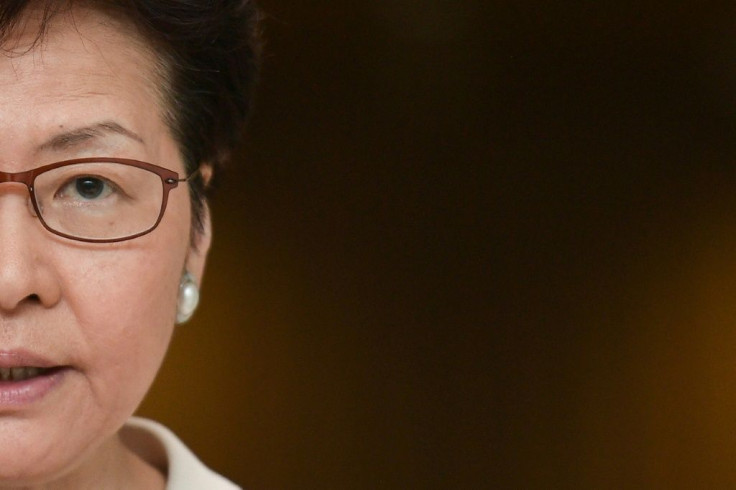In Davos, Hong Kong Battles To Regain Lost Investor Glitter

Bruised by months of street protests and calls to resign, Hong Kong's pro-Beijing leader Carrie Lam came to Davos with a tricky pitch to sell -- that the Chinese territory is still a safe destination for investment and she is not going anywhere.
Her stay at the four-day event in the Swiss Alps, which wraps up Friday, was shadowed by a downgrade from Moody's a day before World Economic Forum (WEF) even began on the grounds of a lack of government response to the protests.
Lam must also now deal with the health, social and economic consequences of the coronavirus in China, openly admitting Hong Kong is extremely vulnerable due to the flows of people from the mainland.
"I feel that we have gone through some very tough times. I personally have gone through and am still going through some very tough times," she said in candid remarks at a dinner late Thursday.
Lam has come under huge pressure as she struggled to end more than seven months of huge and often violent pro-democracy protests in Hong Kong, the most severe challenge to Beijing's rule since the former British colony's 1997 handover to China.
She expressed disappointment with the downgrade from Moody's and acknowledged that negative growth was possible in 2019 and 2020.
But she insisted that the key financial services sector was "as robust as ever" and insisted that it was Hong Kong's special status within China that meant it was still attractive for investment.
"It's a wonderful gateway between the mainland of China as well as the rest of world. It is still a wonderful financial centre," she sad in a keynote speech to Davos on Wednesday.
With Hong Kong also hit by the fallout from US-China trade tensions and now by the outbreak of the coronavirus in China as well, the economy has tipped into recession.
"We don't need a crystal ball to know that there are more changes and uncertainties ahead," acknowledged Laura Cha, the chair of Hong Kong's bourse operator HKEX.
But she added: "We do believe that Hong Kong is resilient. One message tonight is clear: Hong Kong is open to business."
The downgrade by Moody's reflected growing concern within the business community that the institutional features that give Hong Kong more political and economic autonomy are weakening under pressure from Beijing under President Xi Jinping.
David Chiu, head of the Far East Consortium conglomerate, said it was Hong Kong's status within China that would help it out of the crisis.
"In the long run, I think faithfully Hong Kong will come back, there are many, many reasons that I think as a businessman that Hong Kong will come back," he said.
"One of the main reasons is that China is still the best manufacturer of the world."
But according to reactions quoted by Bloomberg News, not everyone was buying what Lam was selling.
Yuan Ding, vice president of China Europe International Business School, said it was unclear what power Lam had to make critical decisions to end the protests. "They are merely putting on a show," he said. "Foreign investors also don't buy this."
Moody's in its downgrade said Lam's administration had no "tangible plan" to address the economic and political concerns of Hong Kongers, and also voiced concerns that Beijing's increased control was threatening the city's much vaunted institutional autonomy.
But Lam also emphasised that Hong Kong was an integral part of China with its own constitutional red lines that should not be overstepped.
"Hong Kong is not a state. It is the Hong Kong Special Administrative Region within the People's Republic of China.
"We have a basic law, which on the one hand gives us the freedoms and the independence of judiciary. On the other hand, it has certain safeguards to make sure that constitutional development is something that is acceptable."
And she argued that stepping down as chief executive would do nothing to help the situation in Hong Kong.
"Leaving that position vacant will only create more uncertainty and confusion."
Listing the numerous troubles besetting Hong Kong, she said: "Hong Kong has several crises to handle, to manage, the economic recession, the continued protests, and political discontent, and lately a public health crisis."
In Hong Kong, where four people have already tested positive for the virus, "we have a system, we have a protocol, we have the resources" to deal with the outbreak of coronavirus, she said.
© Copyright AFP 2024. All rights reserved.




















